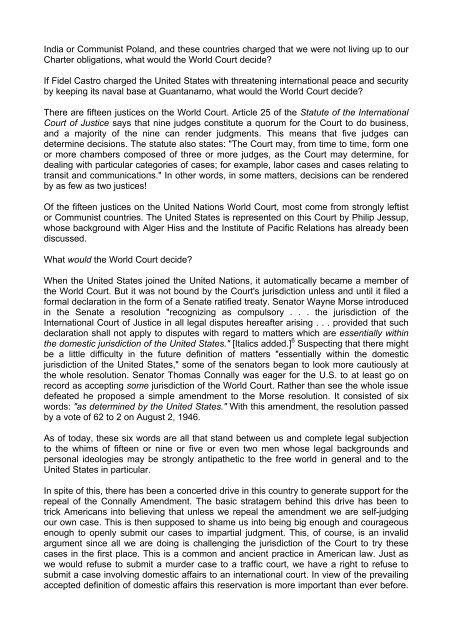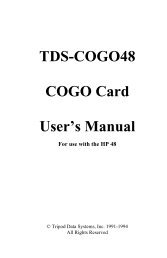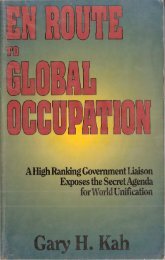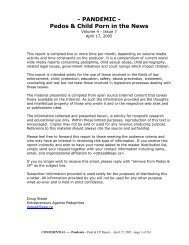G. Edward Griffin - The Fearful Master - PDF Archive
G. Edward Griffin - The Fearful Master - PDF Archive
G. Edward Griffin - The Fearful Master - PDF Archive
Create successful ePaper yourself
Turn your PDF publications into a flip-book with our unique Google optimized e-Paper software.
India or Communist Poland, and these countries charged that we were not living up to our<br />
Charter obligations, what would the World Court decide?<br />
If Fidel Castro charged the United States with threatening international peace and security<br />
by keeping its naval base at Guantanamo, what would the World Court decide?<br />
<strong>The</strong>re are fifteen justices on the World Court. Article 25 of the Statute of the International<br />
Court of Justice says that nine judges constitute a quorum for the Court to do business,<br />
and a majority of the nine can render judgments. This means that five judges can<br />
determine decisions. <strong>The</strong> statute also states: "<strong>The</strong> Court may, from time to time, form one<br />
or more chambers composed of three or more judges, as the Court may determine, for<br />
dealing with particular categories of cases; for example, labor cases and cases relating to<br />
transit and communications." In other words, in some matters, decisions can be rendered<br />
by as few as two justices!<br />
Of the fifteen justices on the United Nations World Court, most come from strongly leftist<br />
or Communist countries. <strong>The</strong> United States is represented on this Court by Philip Jessup,<br />
whose background with Alger Hiss and the Institute of Pacific Relations has already been<br />
discussed.<br />
What would the World Court decide?<br />
When the United States joined the United Nations, it automatically became a member of<br />
the World Court. But it was not bound by the Court's jurisdiction unless and until it filed a<br />
formal declaration in the form of a Senate ratified treaty. Senator Wayne Morse introduced<br />
in the Senate a resolution "recognizing as compulsory . . . the jurisdiction of the<br />
International Court of Justice in all legal disputes hereafter arising . . . provided that such<br />
declaration shall not apply to disputes with regard to matters which are essentially within<br />
the domestic jurisdiction of the United States." [Italics added.] 6 Suspecting that there might<br />
be a little difficulty in the future definition of matters "essentially within the domestic<br />
jurisdiction of the United States," some of the senators began to look more cautiously at<br />
the whole resolution. Senator Thomas Connally was eager for the U.S. to at least go on<br />
record as accepting some jurisdiction of the World Court. Rather than see the whole issue<br />
defeated he proposed a simple amendment to the Morse resolution. It consisted of six<br />
words: "as determined by the United States." With this amendment, the resolution passed<br />
by a vote of 62 to 2 on August 2, 1946.<br />
As of today, these six words are all that stand between us and complete legal subjection<br />
to the whims of fifteen or nine or five or even two men whose legal backgrounds and<br />
personal ideologies may be strongly antipathetic to the free world in general and to the<br />
United States in particular.<br />
In spite of this, there has been a concerted drive in this country to generate support for the<br />
repeal of the Connally Amendment. <strong>The</strong> basic stratagem behind this drive has been to<br />
trick Americans into believing that unless we repeal the amendment we are self-judging<br />
our own case. This is then supposed to shame us into being big enough and courageous<br />
enough to openly submit our cases to impartial judgment. This, of course, is an invalid<br />
argument since all we are doing is challenging the jurisdiction of the Court to try these<br />
cases in the first place. This is a common and ancient practice in American law. Just as<br />
we would refuse to submit a murder case to a traffic court, we have a right to refuse to<br />
submit a case involving domestic affairs to an international court. In view of the prevailing<br />
accepted definition of domestic affairs this reservation is more important than ever before.



![Robert T McQuaid [rtmq@stn.net] Sent: Friday, October 29, 2004 12 ...](https://img.yumpu.com/51070071/1/190x245/robert-t-mcquaid-rtmqstnnet-sent-friday-october-29-2004-12-.jpg?quality=85)







